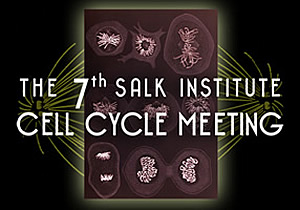
June 9, 2011
Speakers will arrive at the Salk from all over the world on June 17 for a three day meeting on the impact of cell cycle control on human health conditions
Speakers will arrive at the Salk from all over the World on June 17 for a three day meeting on the impact of cell cycle control on human health conditions
La Jolla—The 2011 Cell Cycle meeting will be held at the Salk Institute for Biological Studies in La Jolla, California, starting at 7:00 P.M. on Friday, June 17 and ending on Monday, June 20, 2011. Since 1999 the Salk Institute has held the Cell Cycle Meeting every other year, alternating with Cold Spring Harbor, where the Cell Cycle Meeting was initiated in 1992.
The Cell Cycle Symposium is widely considered to be the most comprehensive ongoing meeting devoted exclusively to developments in the field of cell cycle control. The series of cell cycle meetings have been uniformly successful and have become one of the most important international forums for discussion with the specific goal being: to create a setting in which diverse areas of cell cycle regulation in a broad spectrum of experimental organisms can be openly and critically discussed.

Over a dozen of the leading scientific investigators in the cell cycle field will gather at the Salk including speakers from the University of Toronto, The Scripps Research Institute, The London Research Institute, The New York University School of Medicine, The Stowers Institute, Stanford University, Dana-Farber Cancer Institute, University of California Berkeley, The Ludwig Institute at UC San Diego, Edinburgh University, Ohio State University, Harvard University and The Sanford Burnham Institute.
“This symposium has become a labor of love and public service,” said Dr. Tony Hunter, Professor, Molecular and Cell Biology Laboratory, Director of the Salk Institute Cancer Center and American Cancer Society Professor. “Examining and sharing information about the crucial process of the cell cycle may lend new insights into the identification of biological markers that predict patients’ responsiveness to chemotherapy drugs and ultimately could lead to the development of new cancer drugs with fewer side effects.
Dr. Marc Kirschner, John Franklin Enders University Professor, Chair and Professor of Systems Biology at Harvard, a leader in the cell cycle field, will be delivering The Newport Lecture. John Newport was a faculty member in the Department of Biology at UCSD, and had trained with Marc Kirschner. This Lecture was set up to recognize John Newport’s seminal contributions to the cell cycle field, and will be given at the start of the meeting.
A variety of topics will be covered at the June meeting, including but not limited to; CDK Regulation, Proteolysis, DNA Replication, Mitosis and Meiosis, Checkpoints/Genomic Stability, Cytokinesis and Cell Polarity, Systems Biology and the Cell Cycle, Growth Control/G1-S, Chromatin and Epigenetics.
There will be two or three invited speakers per session All the other oral presentations (10 minute talks) will be chosen from the submitted abstracts, and the individual session topics will be arranged after the abstracts are received. Other abstracts will be presented in poster sessions.
We thank our generous sponsors for their support: Cell Signaling Technology, Genentech, GeneTex, Inc., Celgene, Ubiquigent, and Bio-Rad Laboratories. For more information, please visit the event website at www.salk.edu/CellCycle2011/.
About the Salk Institute for Biological Studies:
The Salk Institute for Biological Studies is one of the world’s preeminent basic research institutions, where internationally renowned faculty probe fundamental life science questions in a unique, collaborative, and creative environment. Focused both on discovery and on mentoring future generations of researchers, Salk scientists make groundbreaking contributions to our understanding of cancer, aging, Alzheimer’s, diabetes and infectious diseases by studying neuroscience, genetics, cell and plant biology, and related disciplines.
Faculty achievements have been recognized with numerous honors, including Nobel Prizes and memberships in the National Academy of Sciences. Founded in 1960 by polio vaccine pioneer Jonas Salk, M.D., the Institute is an independent nonprofit organization and architectural landmark.
Office of Communications
Tel: (858) 453-4100
press@salk.edu